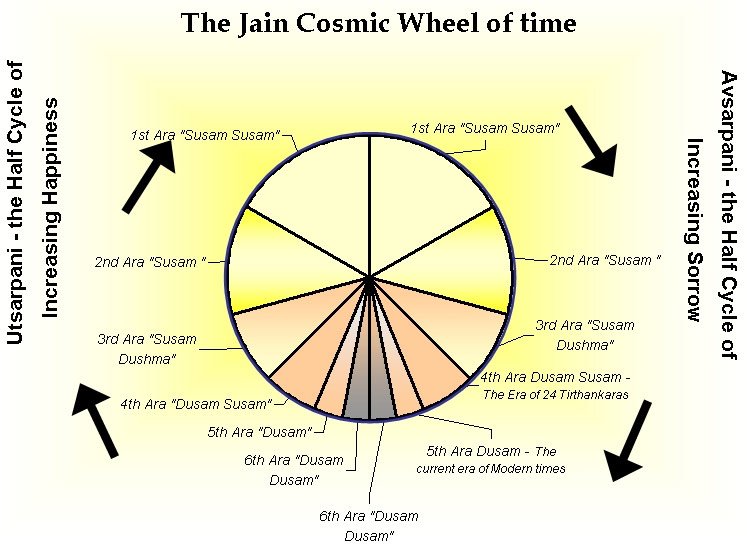Jain Science and Spirituality
by Medhavi Jain | 2020 | 61,419 words
This essay studies the elements of Jainism and investigates how Jain science and philosophy can give the world answers to through science and spirituality. Instead of interpreting it as a confined, strict philosophy, it is shown that Jainism represents a path towards self-awakening through self-improvement....
3.5. Time Cycle in Jain Philosophy
In Jain philosophy, the cosmic time is cyclic, with no beginning or end. It is divided into two kala namely: Utsarpini and Avasarpini. Each one of these is again subdivided into six time periods. Whereas Utsarpini refers to the increase of height, age, beauty, wealth, happiness, knowledge, wisdom and all the other positive traits, with each passing kala, Avasarpini is opposite to that, i.e. all the mentioned traits decrease with the passing of time. Currently we are in the fifth era (ara) of Avasarpini kala. The duration of first three time periods seems beyond our understanding as it is in trillions and trillions of years.
But the fourth era is 42,000 years long and fifth and sixth kala are of 21,000 years each, almost 2700 years have been passed of the current time period which is fifth or pancama kala.
‘In the 6th era, or dushma-dushma kala, all debacle exasperates past all limits; the moons emanate hindering chill, the suns scorching heat, and malice comes sprinkling from the clouds.’[1]
A lot of contemplation is required to understand these time cycles, in order to relate them to our present time and the more one ponder over them the more they make sense.

[Figure: The Jain Cosmic wheel of Time[2] ]
When we study the concept of time in Jainism, we get to know that not only us but also our planet is in a transit journey, in terms of sorrow as the duration of first kala, which is of only happiness, is very long and according to the time cycle both, first kala of avasarpini and last kala of utsarpini, come together, one after the other hence during all that time, peace and immense happiness prevail on our beloved planet; which is the longest in comparison of any other time period.
‘To a physicist, an acausal universe is one in which time is cyclic, rehashing itself a limitless number of times, similar to a film being replayed repeatedly.’[3]
However the exact happenings may differ but the pattern remains the same.
No wonder science has grown tremendously and it is always open for newer inventions and discoveries, still there lie innumerable queries unanswered.
As a species we need to ask ourselves,
‘Is it accurate to say that we are certain we have gotten the hang of everything? Are we directly in all that we have found?' As man began his mission with his interest while the universe existed before additionally, with all her mystery and brilliance. 'What is wonderful about material science today is that we are owning dependable expressions about the very beginning while we are, as a species, still youthful innovatively and we have quite recently started to break free from the detainment of the gravity of our planet.’[4]
Like space, even,
‘Time isn't influenced by the different existents. Jains trust that time is advanced, for example comprises of a vast arrangement of discrete time points. Time as an existent has no start or end. This relates with the Jain perspective of energy as a characteristic power inside the universe that—in terms familiar to modern physics—can 'nor be made nor obliterated'. The universe is additionally seen as traveling through multitudinous upward and descending cycles of time, always restoring itself and hence 'everlasting'.’[5]
It may sound childish when even scientists, like Stephen Hawkins, say that time has a beginning and it must have begun with the birth of our planet. Whereas the concept of eternity of time provides all the answers one can think of. However, space and time, despite being the topics of our daily talks hold much secrets within and the more one dives deeper into them, the more one finds.
Footnotes and references:
[1]:
TDTJ. pp. 226
[2]:
https://en.wikipedia.org/wiki/Jain_cosmology (retrieved on 24/05/2017 @ 12 pm)
[3]:
BE. pp. 187
[4]:
BE. pp. 198
[5]:
LJ. pp. 104
